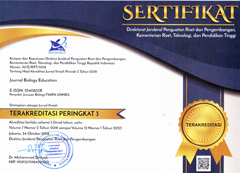The Development of Ecosystem E-Module Based on Inquiry Learning to Improve High School Students Learning Outcomes
Abstract
The development of ICT has driven changes in the learning process by utilizing the latest innovative teaching materials called mobile learning that can be applied to learning using Android-based smartphones . Learning innovations that need to be developed by utilizing mobile learning are e-module. Learning ecosystem material requires analysis and direct observation so effective teaching materials are needed using Information Technology (IT) which is based on inquiry learning and is used by students for independent and enjoyable learning. Technological advances in education have not been implemented in teaching materials in schools. This study aims to analyze the feasibility and analyze student learning outcomes using the e-module ecosystem based on inquiry learning. The research location is SMA Negeri 1 Bandar. Research and Development (R&D) stages include identification of potential and problems, data collection, e-module design, e-module validation, revision I e-module design, small-scale trials, revision II e-module design, scale e-module design large trials, final revisions and product material e-module ecosystem based on inquiry learning. The method of data analysis was carried out by administering media and material validity questionnaires, as well as practicality questionnaires on small and large-scale tests. Data analysis uses descriptive percentages. The results showed that the e-module was feasible as a teaching material with a media percentage of 91.25 % and material of 71.25%. The subjects of this study were students in classes X IPA 1, X IPA 2, X IPA 3, and X IPA 4. Practical e-modules were used as teaching materials with a percentage of small-scale trials of 78% and the percentage of completeness of small-scale classical was 86%. A large-scale trial based on teacher responses of 100% and student responses X IPA 1, X IPA 2, and X IPA 3 totaling 103 students getting a percentage of 99.02% in the very good category. The students' classical completeness in the large-scale test for class X IPA 1, X IPA 2, and X IPA 3 was 89.63% . Based on these results, it can be obtained that the e-module ecosystem based on inquiry learning that has been developed can be applied in learning for high school students in class X IPA and the learning outcomes of class X IPA students in the study have fulfilled the classical completeness criteria with a percentage of ≥85%.
The copyright of the article once it is accepted for publication shall be assigned to the journal as the publisher. The intended copyright includes the right to publish the article in various forms (including reprints). The journal maintains the publishing rights to the published articles.
This work is licensed under a Creative Commons Attribution 4.0 International License.







